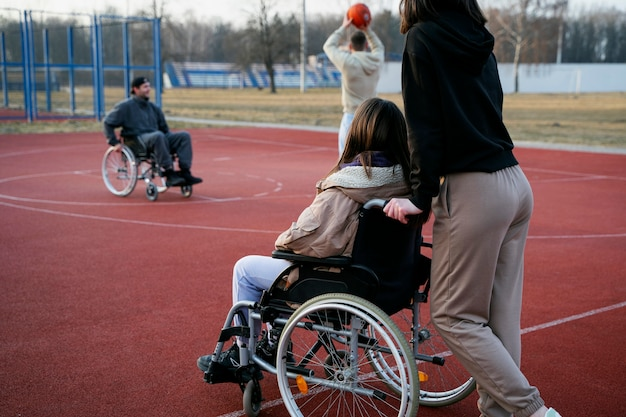Gross Motor Disabilities in Lexington, KY

Understanding Gross Motor Disabilities: Specialized Care at Kentucky Therapy Solutions
Living with a gross motor disability affects every aspect of a child’s daily life. At Kentucky Therapy Solutions in Lexington & Georgetown, KY, we understand the unique challenges your child faces. Our specialized team provides comprehensive care focused on improving mobility, independence, and quality of life for children with gross motor disabilities.
What Are Gross Motor Disabilities?
Gross motor disabilities affect the body’s large muscle groups, impacting movements like walking, running, jumping, and maintaining balance. These disabilities can stem from various causes, including developmental delays, neurological conditions, genetic disorders, or acquired injuries.
Types of Gross Motor Disabilities
At Kentucky Therapy Solutions, we treat a wide range of gross motor disabilities affecting children’s movement and physical function. Understanding these conditions helps us provide targeted, effective interventions that support your child’s development and independence.
1. Developmental-Based Motor Disabilities
- Developmental Coordination Disorder (DCD) Developmental Coordination Disorder affects school-age children, significantly impacting their daily activities and participation. Children with DCD often struggle with motor planning and sequencing, making it challenging to learn and perform new movement patterns. This impacts their ability to participate fully in sports, playground activities, and even basic daily tasks. These children often appear clumsy or uncoordinated, but their motor difficulties are not due to general medical conditions or intellectual challenges.
- Global Developmental Delay Children with Global Developmental Delay experience challenges across multiple areas of development, with significant impact on their motor abilities. These children typically show delayed achievement of motor milestones and face ongoing challenges with fundamental movement patterns. Their development follows a typical sequence but at a slower pace, requiring additional support and modified expectations for skill acquisition. Many children benefit from early intervention and consistent therapeutic support to maximize their developmental potential.
- Motor Learning Difficulties Motor learning challenges present unique obstacles in a child’s development journey. These children often struggle to learn and adapt new movement patterns, showing inconsistent performance in physical activities. While they may eventually master specific skills, transferring these abilities to new situations or environments proves challenging. Understanding these learning patterns helps us develop effective strategies that support skill acquisition and generalization across different settings and activities.
- Hypotonia Children with low muscle tone face distinct challenges in developing and maintaining proper posture and movement patterns. Hypotonia affects their ability to initiate and control movements efficiently, often leading to delayed motor development and increased fatigue during activities. These children typically require specific interventions to build core stability and strength while developing compensatory strategies for improved function in daily activities
2. Neurological-Based Motor Disabilities
- Cerebral Palsy As the most common motor disability in childhood, cerebral palsy presents with varying patterns of movement and posture challenges. Children with spastic cerebral palsy experience increased muscle tone that can limit their movement and flexibility. Those with dyskinetic cerebral palsy face challenges with controlling their movements due to fluctuating muscle tone. Ataxic cerebral palsy primarily affects balance and coordination, impacting precise movements and stability. Many children present with mixed patterns, requiring individualized treatment approaches that address their specific movement challenges.
- Muscular Dystrophy Progressive muscle weakening characterizes various forms of muscular dystrophy, affecting children’s mobility and independence over time. This condition impacts not only muscle strength but also movement efficiency and endurance. Children with muscular dystrophy require carefully planned interventions that balance activity with energy conservation, focusing on maintaining function while preventing secondary complications. Our approach evolves with the condition’s progression, ensuring appropriate support at each stage.
- Spina Bifida Children with spina bifida experience varying degrees of motor challenges depending on the level and severity of their condition. The impact on lower extremity strength and sensation affects their mobility and independence in daily activities. These children often develop unique movement patterns to compensate for their physical challenges. Our interventions focus on maximizing functional abilities while preventing secondary complications, supporting independence in mobility and daily activities.
- Acquired Brain Injuries When children experience brain injuries, their motor function can be significantly affected. Changes in muscle tone, coordination, and movement planning create unique challenges in recovery and rehabilitation. Each child’s presentation is unique, requiring individualized assessment and treatment approaches. Recovery patterns vary, but many children show significant improvement with appropriate therapeutic intervention and support.
3. Impact of Growth and Development
The effects of gross motor disabilities evolve as children grow and develop. Physical growth can impact established movement patterns and compensatory strategies, requiring ongoing assessment and modification of therapeutic approaches. Additionally, changing social and educational demands necessitate regular updating of goals and interventions to ensure children can participate effectively in age-appropriate activities.
Our team at Kentucky Therapy Solutions understands these complex interactions between growth, development, and motor disabilities. We provide comprehensive care that adapts to your child’s changing needs while supporting their overall development and participation in daily life. Through careful assessment and individualized treatment planning, we help each child reach their highest potential for functional independence and participation in family, school, and community activities.
Signs and Impact on Daily Life
Physical Manifestations
- Delayed achievement of motor milestones
- Difficulty with balance and coordination
- Unusual movement patterns
- Muscle weakness or altered tone
- Fatigue during physical activities
Functional Challenges
- Struggles with playground activities
- Difficulty keeping up with peers
- Challenges in physical education
- Problems with daily living tasks
- Reduced participation in age-appropriate activities
Our Comprehensive Treatment Approach
At Kentucky Therapy Solutions, we provide individualized care through:
Physical Therapy
Our specialized pediatric physical therapy focuses on:
1. Foundational Skills
- Core strength development
- Balance and coordination training
- Gait pattern optimization
- Postural control enhancement
- Movement pattern trainin
2. Functional Activities
- Age-appropriate play skills
- School-based activity preparation
- Community participation skills
- Sports and recreation adaptation
Therapy Support
Our therapists help with:
- Daily living activities
- Fine motor skill development
- Environmental adaptations
- School task modifications
- Play and social participation
Age-Specific Interventions
Early Childhood (0-3 years)
- Development of early motor patterns
- Parent education and coaching
- Play-based therapy approaches
- Milestone achievement support
Preschool Age (3-5 years)
- Preparation for school activities
- Peer interaction skills
- Basic motor pattern refinement
- Independence in daily tasks
School Age (6-12 years)
- Academic environment adaptation
- Physical education participation
- Social activity inclusion
- Sports and recreation modifications
Adolescence (13-18 years)
- Life skill development
- Community participation
- Advanced mobility training
- Transition planning
Assessment and Progress Monitoring
Our initial evaluation includes:
- Comprehensive movement assessment
- Functional skill analysis
- Development history review
- Goal setting with family input
Meet Our Expert Team
Mallory Leet, M.S. CCC-SLP, specializes in pediatric gross motor disabilities. Our team stays current with the latest treatment approaches through ongoing education and training.
Frequently Asked Questions
How often will my child need therapy?
Treatment frequency is highly individualized and depends on several important factors. Initially, most children benefit from 2-3 sessions per week to establish a strong foundation and begin making progress toward their goals. As they advance, we may adjust this frequency based on their progress, family schedule, and ongoing needs.
We regularly assess and modify the treatment schedule considering:
- Your child’s specific diagnosis and severity of motor challenges
- Current developmental stage and growth patterns
- Response to therapy interventions
- Family goals and priorities
- School or activity schedules
- Home program participation
The key is finding the right balance that promotes optimal progress while fitting realistically into your family’s life and routine.
What results can we expect?
Every child’s journey is unique, and progress depends on multiple factors including their specific condition, age, and level of involvement. While we can’t predict exact outcomes, we consistently see improvements in functional abilities when children participate regularly in therapy and follow through with home programs.
Common areas of progress include:
- Improved strength and coordination
- Enhanced ability to participate in age-appropriate activities
- Greater independence in daily tasks
- Better balance and movement control
- Increased confidence in physical activities
We measure progress through standardized assessments, functional goal achievement, and most importantly, your child’s increased participation in meaningful activities. Our team regularly updates you on your child’s progress and adjusts goals as needed to ensure we’re always working toward meaningful outcomes.
How can parents support progress?
Parent involvement is crucial for optimal outcomes, and we consider you an essential member of your child’s therapy team. We provide comprehensive support to help you integrate therapeutic activities into daily routines effectively.
This includes:
- Detailed home exercise programs tailored to your family’s schedule
- Education about your child’s condition and development
- Practical strategies for modifying daily activities
- Regular updates on progress and goal adjustment
- Training in proper positioning and handling techniques
- Recommendations for adaptive equipment when needed
We teach you to recognize opportunities for incorporating therapeutic activities into everyday situations, making therapy a natural part of your daily routine rather than an additional task to complete.
What should we expect during the initial evaluation?
The initial evaluation is comprehensive and typically takes 60-90 minutes. During this session, we:
- Review your child’s medical history and development
- Discuss your specific concerns and goals
- Conduct standardized assessments appropriate for your child’s age and condition
- Observe your child’s movement patterns and functional abilities
- Develop an initial treatment plan with your input
- Establish measurable goals for therapy
This evaluation helps us create a targeted treatment approach that addresses your child’s specific needs while considering your family’s goals and priorities.
How do you determine when therapy can be reduced or discontinued?
This decision is based on several factors and is always made in collaboration with your family. We consider:
- Achievement of established therapy goals
- Rate of ongoing progress
- Level of independence in daily activities
- Age-appropriate participation in home/school/community activities
- Family comfort level with managing ongoing needs
- Upcoming developmental transitions or challenges
Often, we gradually reduce frequency while maintaining periodic check-ins to monitor progress and address any new challenges that arise with growth and development.
Family-Centered Approach
We believe in partnering with families to:
- Establish meaningful goals
- Develop practical home strategies
- Create supportive environments
- Celebrate achievements together
- Plan for long-term success
Take the First Step
Early intervention is key to optimal outcomes. Contact Kentucky Therapy Solutions today to schedule a comprehensive evaluation.
Contact Us:
- Phone: Call us at (859) 203-4878.
- Online: Fill out our short form on our Request an Appointment page.
- In-Person: Stop by our clinic in Lexington & Georgetown, KY.
Schedule your child’s evaluation today and take the first step toward supporting their development and success.
At Kentucky Therapy Solutions, we’re committed to helping your child achieve their highest potential. Our evidence-based approach ensures comprehensive care that evolves with your child’s needs and goals.


